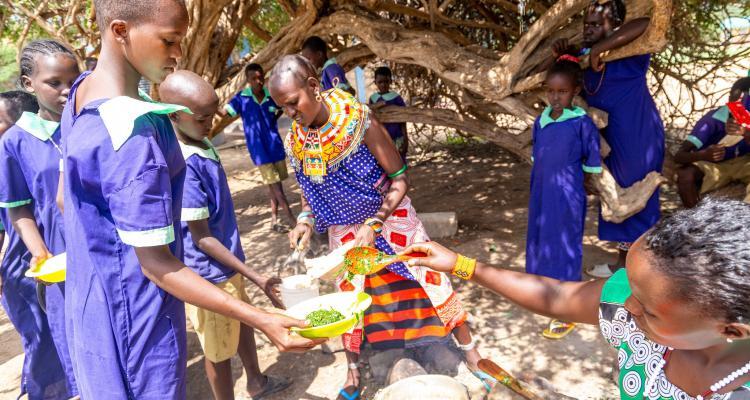
At least 216 million African children suffer from stunting and malnutrition. In sub-Saharan Africa, malnutrition is the second leading cause of death among children after malaria. To end this situation, the African Development Bank is stepping up its actions and its calls for mobilization both in Africa and worldwide.
In 2016, the Bank launched the African Leaders for Nutrition (ALN) initiative as an advocacy tool that would enable African countries to work with partners to boost nutrition on the continent.
Backed by the African Union, the initiative also commits African governments to commit part of their budgets to reducing malnutrition. In particular, countries are invited to implement policies and interventions to combat malnutrition through agriculture, the food system and education, in tandem with various development partners.
Race against time
To demonstrate its commitment to combating malnutrition in Africa, in 2018, the Bank also unveiled the Multisectoral Nutrition Action Plan. The plan seeks to mobilize additional financial resources for smart nutrition investments in the key sectors of agriculture, education, health, social protection, and water, sanitation and hygiene to reduce child stunting on the continent by 40% through 2025.
These sectors account for over 30% of public spending in Africa and are the underlying drivers of nutrition. So far, the Bank has allocated nearly $2.8 billion of its portfolio to smart nutrition, on a baseline of USD 0.70 billion in 2018, broken down as follows: health (USD 531 million), agriculture (USD 950 million), WASH (USD 650 million) and social protection (USD 605 million).
Moreover, the Bank is continually stepping up initiatives to ensure that thousands of African children have the chance to celebrate their fifth birthday.
Through the “Banking on Nutrition” (https://apo-opa.info/3JnGpWS) programme, a partnership with Big Win Philanthropy and the Aliko Dangote Foundation, the Bank is leading the urgent fight against infant malnutrition.
The programme is mainstreaming nutrition into regional and national strategies and work to increase the production and consumption of healthy, nutritious food through the mobilization of partnerships, governments and the private sector.
For example, in the Sahel region, which faces enormous impacts from climate change including desertification, drought, erosion, flooding and political insecurity, the bank is implementing a specific regional programme on food security and nutrition.
The Programme to Build Resilience to Food and Nutrition Insecurity in the Sahel exemplifies the sort of collaboration the Bank seeks to establish with other development partners to combat malnutrition.
With contributions from the Canada-African Development Bank Climate Fund, the West African Development Bank , and the African Development Fund, the African Development Bank Group’s concessional window, the initiative will mobilize $176 million to sustainably increase productivity and income from agrarian, forestry, pastoral and fisheries value chains.
The programme is also strengthening Africans’ capacity to adapt to climatic hazards and contributes to mitigating the effects of climate change in six countries: Burkina Faso, Guinea, Mali, Niger, Senegal and Togo. Some 1.38 million people will benefit directly from this project, and a further 5.69 million will benefit indirectly.
In Burkina Faso, the School Meals with Local Produce for Intelligent Nutrition Projectl, financed by Japan through the African Development Bank, keeps thousands of schoolchildren in school. With funding of $990,000, the project is reinforcing efforts by the Burkina Faso government to ensure that every child in elementary school has at least one balanced meal a day.
Adesina among the UN’s global champions against malnutrition
In 2019, the Bank approved a grant of $8 million for the creation of the Regional Centre of Excellence in Nutritional Sciences in Burundi. It will help address the shortage of qualified nutrition and agro-processing specialists to strengthen food security in Burundi and the East Africa region. The project was implemented against a backdrop of high rates of chronic malnutrition in Burundi (56%) and East Africa.
The centre will offer courses in clinical nutrition, nutrition and public health, agrifood technology, food quality, food safety and climate change. By June 2022, the syllabi had been developed and a cohort of 59 students enrolled for training.
As affirmation of his work on nutrition, bank President, Dr Akinwumi Adesina, has just been appointed by UN Secretary-General António Guterres as one of 22 global leaders to spearhead the fight against malnutrition at a critical time for food and nutrition security. Other global leaders include Cindy McCain, Executive Director of the World Food Program; Catherine Russell, Executive Director of UNICEF; Gabriela De Bukele, First Lady of El Salvador; Sania Nishtar, member of the Senate and President of the NGO Heartfile in Pakistan; and Gunhlid Stordalen, Founder and President of the EAT Foundation in Norway, also feature on the list.
“I am greatly honoured by the United Nations Secretary General appointing me among global leaders to tackle global malnutrition. Thank you SG. I look forward to helping to deliver on this agenda,” said Dr Adesina on Twitter, welcoming the news.
The appointment should reinforce the commitment of Mr. Adesina, under whose leadership, the Bank has helped mobilize $72 billion from international partners, following the Dakar 2 Summit on Food Sovereignty and Resilience, to boost food and agricultural production in Africa. The Bank itself has committed to invest $10 billion in the sector over the next five years in Africa.
Follow us on Twitter:














